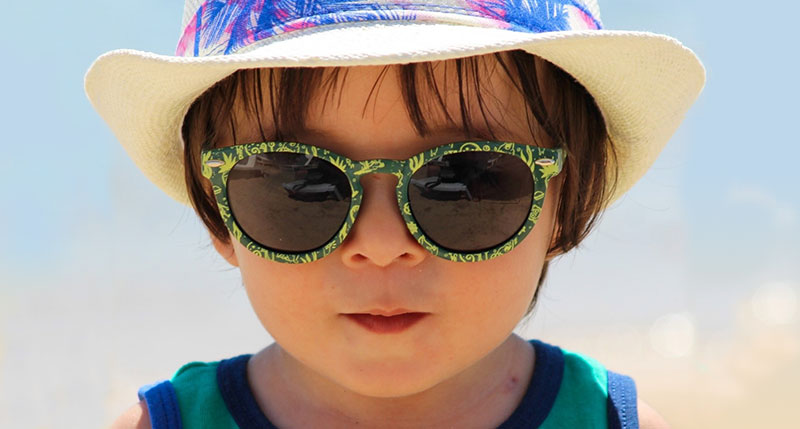What’s cuter than a toddler in sunglasses? Not much! But does your toddler really need sunglasses? And if so, how can you get him to wear them consistently?
Do toddlers need sunglasses?
The answer is yes! Your toddler’s developing eyes will benefit from wearing sunglasses. In addition to looking great, sunglasses provide a significant health benefit to every wearer by protecting their eyes from the harmful ultraviolet radiation (UV rays) of the sun. These rays rain down on us every day—365 days a year, whether it’s sunny, cloudy, or rainy.
And a child’s eyes are much more susceptible to damage from UV rays because their pupils don’t constrict as tightly as adult pupils do. That means more UV rays are absorbed by your child’s eyes, increasing their risk of developing complications from long-term sun exposure later in life such as cataracts, skin cancer, and macular degeneration.
From the time your child is 6 months old, they can wear sunglasses. (Before age 6 months, parents should protect their newborn’s eyes and skin from the sun with hats and sun shades.)
Here are 6 must-have qualities to look for in kids’ sunglasses:
- Lenses that block 99% of the sun’s harmful UVA and UVB rays. This is the top priority for kids’ sunglasses, so don’t compromise on it. You get what you pay for: Those cheap sunglasses at the dollar store are not regulated and may or may not offer UV protection. (Even if they have a little oval sticker on them that says they do.) To be certain you’re giving your child the best possible sun protection, buy high-quality sunglasses from a source you can trust.
- Scratch-resistant plastic lenses are best. You think adults are hard on sunglasses? Kids take it to the next level. Dropping them on the playground, at the beach, or in your backyard is an everyday occurrence for kids. Plastic, scratch-resistant lenses will go a long way toward maximizing their useful life.
- Look for lenses that block 75-85% of incoming light. You don’t want super-dark lenses that block too much light, or your child won’t be able to see well enough, but you want the lenses to protect their eyes sufficiently.
- Check kids’ sunglass lenses for uniform tint. While ombre lens styles may be in fashion, a uniform tint on sunglass lenses offers the most sun protection.
- Opt for gray-colored lenses. Gray lenses are the standard in sunglasses because they distort colors the least. Gray lenses allow your kids to see the natural color of their surroundings safely. Though there are red, yellow and blue sunglass lenses available, go gray for kids!
- Beware poor optical quality. Once again, bargain sunglasses probably aren’t a bargain when you consider their quality. Bargain sunnies sometimes have poor optical quality in the lenses that blur or distort vision. Our optician will help you select the best pair of sunglasses for your child that will both look cute and function properly to protect their precious vision!
Another important factor in kids’ sunglasses is that they like them and will want to wear them. In our next blog post, we’ll discuss ways to help your toddler become an early adopter of wearing her sunglasses—a healthy habit that will serve her well throughout her life!
We look forward to seeing you and your child in our optical department so we can help you find the perfect pair of sassy sunnies for your child!

Recent Comments